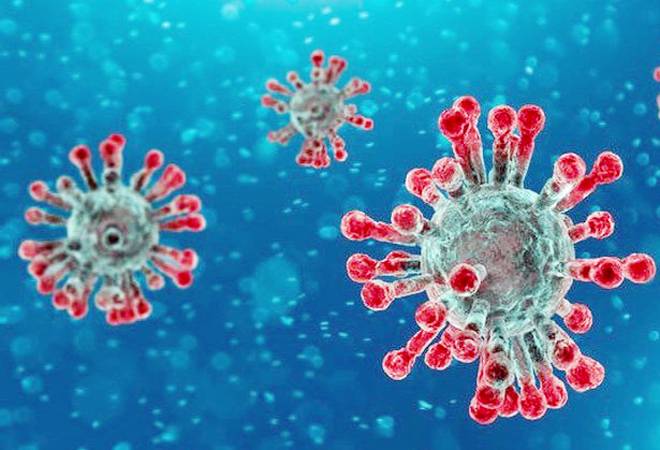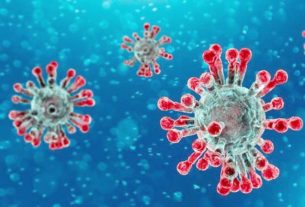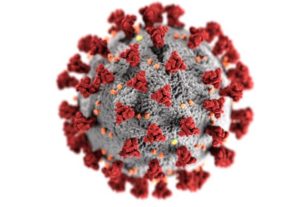From Our Bureau
The Corona Virus (CPVID-19) pandemic situation remained critical globally, with the confirmed cases across the world increasing to 10,51,635 and the death toll shooting up to 56,985 in the 208 affected countries and territories.
According to the latest update from the World Health Organization (WHO), the number of COVID-19 confirmed cases soared by 79,332 and the confirmed death toll increased by 6,6,64 in the last 24 hours.
In India, the number of confirmed cases touched 2,902 and the death toll reached 68 on 4th April. 168 persons have been cured/ discharged from the hospitals after recovery.
In Telangana State, the total number of confirmed cases increased to 272, with 11 deaths and 33 persons discharged after cure.
Globally, European region continued to be the worst-hit, with 5,83,141 confirmed cases and 42,334 deaths. American region came next with 2,79,543 confirmed cases and 6,802 deaths. Western Pacific region’s tally stood at 1,10,362 confirmed cases and 3,809 deaths. Eastern Mediterranean region reported 65,903 confirmed cases and 3,592 deaths. South-East Asia region recorded 6,582 confirmed cases and 267 deaths and African region witnessed 5,446 confirmed cases and 170 deaths. WHO Risk Assessment at global level remained very high.
One new country/territory/area reported cases of COVID-19 in the past 24 hours: Bonaire, Saint Eustatius and Saba.
As worldwide cases climbed above 1 million and deaths over 50 000, WHO Director-General Dr Tedros stressed that the best way for countries to end restrictions and ease their economic effects was to attack the virus with an aggressive and comprehensive package of measures.
WHO has released new technical guidance recommending universal access to public hand hygiene stations and making their use obligatory on entering and leaving any public or private commercial building and any public transport facility. It also recommends that healthcare facilities improve access to and practice of hand hygiene.
WHO/Europe has received a €30 million contribution from the European Commission for 6 WHO European Region Member States – Armenia, Azerbaijan, Belarus, Georgia, the Republic of Moldova and Ukraine – to meet immediate needs in their responses to COVID-19.
In India, the Ministry of Health and Family Welfare stated asserted various actions have been initiated by Government of India along with the States/UTs for the prevention, containment and management of COVID-19 in the country. These are being regularly monitored at the highest level.
In order to address the requirements of containment and management of COVID-19 in the country, various levels of health professionals including doctors, nursing professionals, allied healthcare professionals and others are available. As many as 9.70 lakh ASHAs, one lakh AYUSH professionals, NCC Cadets, ex-Servicemen, Red Cross/NSS/ NYK volunteers, employees from gram panchayats and Urban Local Body employees, Civil Society Organisations may be involved as required.
A Standard Operating Protocol (SOP) for reallocation of residents/ PG Students and nursing students as part of hospital management has been prepared. Additionally, more than 31,000 doctors including retired doctors from Government, Armed Forces Medical Services, Public Sector undertakings, and private doctors have voluntarily signed up to join the fight against COVID-19.
Ministry of Health & Family Welfare had released the advisory on the use of ‘Homemade Protective Cover for Face & Mouth.’ 30 Training Modules have so far been prepared and compiled on various topics such as clinical management, ventilator support, infection prevention and control, quarantine management etc. and these are available online on the Health Ministry website: https://www.mohfw.gov.in/.
It has been observed that most of the deaths are being reported from elderly people or people having co-morbidities such as diabetes, hypertension, kidney/ cardiac issues etc. Hence, all people falling in the high risk category need to follow all precautions.
Moreover, an age profile analysis of all the positive cases being reported so far shows that:
○ 8.61% cases is between 0-20 years
○ 41.88% cases is between 21 to 40 years
○ 32.82% cases is between 41 to 60 years
○ 16.69% cases above 60 years
Under Lifeline UDAN, air cargo carriers have transported around 119 tons, till date, across all States with special focus to North Eastern regions and hilly areas, which includes COVID-19 related reagents, enzymes, medical equipment, testing kits, Personal Protective Equipment (PPE), masks, gloves, etc.
As of now, 2902 confirmed cases and 68 deaths have been reported. 183 persons have been cured/discharged from the hospitals after recovery. Out of total 2,902 reported, 1,023 cases have been linked to Tablighi Jamaat across 17 States which includes Tamil Nadu, Delhi, Andhra Pradesh, Assam, Jammu & Kashmir, Rajasthan, Telangana, Andaman & Nicobar Islands, Arunachal Pradesh, Haryana, Himachal Pradesh, Jharkhand, Karnataka, Kerala, Maharashtra, Uttarakhand and Uttar Pradesh.
According to Media Bulletin from the Director, Public Health & Family Welfare, in view of Covid-19 global pandemic, the State of Telangana has strengthened surveillance, contact tracing and containment measures against the possible spread of disease.
In 22 out of 33 Districts, where the Covid-19 cases have been reported, containment process was initiated and till date 1,376 teams were deployed. They surveyed 1,07,658 households and 4,45,938 persons. 147 symptomatic persons were referred to the hospitals. Till date, there is no evidence of Community transmission in Telangana.
Daily video conference is being conducted by Chief Secretary with all concerned senior officials and doctors from 9 am to 11am. 6 Diagnostic labs are functional 24/7 to meet the Diagnostic demand. The travelers and their contacts of Markaz, Delhi are being tracked, tested and treated for COVID-19. Containment activity has been taken up in all the districts where the positive cases are reported.
Any person who has been a contact of any traveller from Markaz is requested to access the nearest government health care facility in case of onset of symptoms. The Public is requested to stay calm and not to panic. State is taking all the measures to contain the spread of the virus to protect and safeguard the public. To maintain personal hygiene, hand hygiene, social distancing, cough hygiene and other preventive measures are necessary.
Referring to the current global situation, WHO Director-General Dr Tedros Adhanom Ghebreyesus, at a media briefing, said “more than 1 million confirmed cases of COVID-19 have now been reported to WHO, including more than 50,000 deaths. But we know that this is much more than a health crisis. We are all aware of the profound social and economic consequences of the pandemic. The restrictions many countries have put in place to protect health are taking a heavy toll on the income of individuals and families, and the economies of communities and nations.”
“We are in a shared struggle to protect both lives and livelihoods. In the short term, countries can ease the burden on their populations through social welfare programs to ensure people have food and other life essentials. For some countries, debt relief is essential to enable them to take care of their people and avoid economic collapse. This is an area of cooperation between WHO, the IMF and the World Bank,” he added.
“But ultimately, the best way for countries to end restrictions and ease their economic effects is to attack the virus, with the aggressive and comprehensive package of measures that we have spoken about many times before: find, test, isolate and treat every case, and trace every contact. If countries rush to lift restrictions too quickly, the virus could resurge and the economic impact could be even more severe and prolonged,” he observed.
“Financing the health response is therefore an essential investment not just in saving lives, but in the longer-term social and economic recovery. There are three main areas for countries to focus on. First, we call on all countries to ensure core public health measures are fully funded, including case-finding, testing, contact tracing, collecting data, and communication and information campaigns. Second, we also call on countries and partners to strengthen the foundations of health systems. That means health workers must be paid their salaries, and health facilities need a reliable supply of funding to purchase essential medical supplies. Third, we call on all countries to remove financial barriers to care,” WHO Director-General said.
“If people delay or forego care because they can’t afford it, they not only harm themselves, they make the pandemic harder to control and put society at risk. Several countries are suspending user fees and providing free testing and care for COVID-19, regardless of a person’s insurance, citizenship, or residence status. We encourage these measures. This is in an unprecedented crisis, which demands an unprecedented response. Suspending user fees should be supported with measures to compensate providers for the loss of revenues,” he pointed out.
“Governments should also consider using cash transfers to the most vulnerable households to overcome barriers to access. This may be particularly important for refugees, internally displaced persons, migrants and the homeless,” he added.
“The pandemic is also having an effect on the fight against other diseases, like polio. As you know, in recent years we have driven polio to the brink of eradication. This has been a massive global effort, started by Rotary, supported by many other partners, and led by thousands of health workers, vaccinating children in some very difficult and dangerous areas. Many of those health workers are now supporting the COVID-19 response. They are tracing contacts, finding cases and providing public health information to communities,” he explained.
Other excerpts from the media briefing of the WHO Director-General:
To reduce the risk of increasing transmission of COVID-19, the polio oversight board has made the hard decision to suspend house-to-house vaccination campaigns, knowing that this may lead to an increase in polio cases. To reduce this risk, we will support countries to maintain essential immunization for all vaccine preventable diseases.
WHO has published guidance for countries on how to maintain essential health services even while responding to this crisis. The Global Polio Eradication Initiative is working to ensure that once it is safe to do so, countries can be supported to rapidly restart polio vaccination campaigns. While all our energy may be focused on COVID-19 now, our commitment to eradicating polio is unshakeable.
Sadly, there are reports from some countries of an increase in domestic violence since the COVID-19 outbreak began. As people are asked to stay at home, the risk of intimate partner violence is likely to increase. Women in abusive relationships are more likely to be exposed to violence, as are their children, as family members spend more time in close contact, and families cope with additional stress and potential economic or job losses. Women may have less contact with family and friends who may provide support and protection from violence.
We call on countries to include services for addressing domestic violence as an essential service that must continue during the COVID-19 response. If you are experiencing or at risk of domestic violence, speak to supportive family and friends, seek support from a hotline, or seek out local services for survivors. Make a plan to protect yourself and your children any way you can. This could include having a neighbour, friend, relative, or shelter identified to go to should you need to leave the house immediately. There is never any excuse for violence. We abhor all violence of all forms, at all times.
Finally, the global response to COVID-19 would not be possible without the generosity of countries and partners. Two months ago, WHO issued its Strategic Preparedness and Response Plan, with an initial ask of US$675 million to support the response. I’m delighted to say that almost US$690 million has now been pledged or received. Of this amount, US$300 million has been given to support WHO’s work, and the rest has been given on a bilateral basis, or to other organizations involved in the response. I’d like to thank the State of Kuwait, which today is becoming one of the largest donors, with a total of US$60 million.
WHO’s Solidarity Response Fund has now raised more than US$127 million from more than 219,000 individuals and organizations. I’d like to thank Tencent for its contribution of US$10 million. I’m also pleased to announce that I have invited UNICEF to join the Solidarity Response Fund. UNICEF has extensive experience both in fundraising and in implementing programmes, and our partnership will help us to work together closely to save lives. We still have a long way to go in this fight. WHO is working every day with all countries and partners to save lives, and to mitigate the social and economic impact of the pandemic.
(eom)



